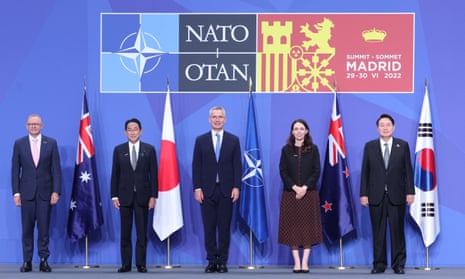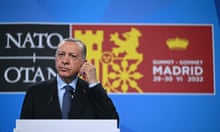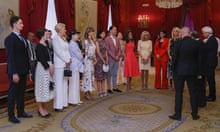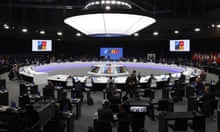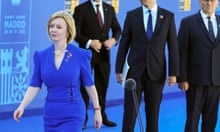Prime minister Jacinda Ardern has urged democratic nations to stand firm as China becomes “more assertive” and “willing to challenge international rules and norms,” in New Zealand’s first-ever formal address to Nato.
New Zealand has toughened its tone recently on security and Beijing’s growing presence in the South Pacific, in part due to the signing of a security pact between China and Solomon Islands.
At a summit where Nato for the first time identified Beijing as a serious challenge, Ardern dedicated part of her speech to warning of China’s increasingly muscular international presence – while calling for dialogue and diplomacy rather than increased militarisation in response.
“China has in recent times also become more assertive and more willing to challenge international rules and norms,” she said.
“Here, we must respond to the actions we see. We must stand firm on the rules-based order, call for diplomatic engagement and speak out against human rights abuses at all times when and where we see them. But we also must resist the temptation to simplify the increasingly complex world in which we live.”
Much of the prime minister’s speech was dedicated to calls for diplomacy, multilateralism, and commitment to dialogue, even as the US and other western partners have increasingly hardened their positions on Russia and China.
“New Zealand is not here to expand our military alliances. We are here to contribute to a world that lessens the need for anyone to call on them,” she said.
“We must use diplomacy at every opportunity, until it has proven to fail.”
As well as her remarks on China, Ardern used much of her speech to discuss the conflict in Ukraine – speaking of New Zealand’s commitment to nuclear-free status, and calling on Nato members to “halt in the production of weapons that create our mutually assured destruction”.
“I also come with a request: that we do not allow the legacy of the war in Ukraine to become an arms race, or an even more polarised and dangerous world.”
Her address reflected New Zealand’s incremental moves to align more closely with “likeminded” partners, said strategic studies prof Robert Ayson, of Victoria University.
Ardern’s administration has attempted to walk a delicate line – maintaining open dialogue and strong trade relations with China, while still speaking out on specific disagreements. At times, the government has been accused of taking a “softer” line than some of its allies because of its trade dependency – China is New Zealand’s largest trading partner, accounting for 30% of all exports.
The Australian prime minister, Anthony Albanese, attending his first Nato summit in Madrid, echoed some of Ardern’s sentiments with a warning that the strengthening of relations between Beijing and Moscow posed a risk to all democratic nations.
“Just as Russia seeks to recreate a Russian or Soviet empire, the Chinese government is seeking friends, whether it be … through economic support to build up alliances to undermine what has historically been the western alliance in places like the Indo-Pacific,” he told the summit on Wednesday.
Albanese spoke to reporters after having a meeting on the sidelines with the leaders of Japan, South Korea and New Zealand – the “Asia-Pacific 4”.
“There we discussed the important focus of this Nato summit on the Asia-Pacific region. The Russian invasion of Ukraine has solidified the support amongst democratic countries for the rules-based international order,” he said.
Ardern’s speech did not represent a radically tough new line on Beijing, Ayson said. “This is not Ardern’s stick-it-to-China moment,” he said, but reflected the tensions of New Zealand’s position. “Wanting de-escalation on the one hand, and then obviously working closely with partners who are trying to compete with Russia and China.”
Jason Young, Director of the NZ Contemporary China Research Centre, said New Zealand’s orientation toward China had shifted over the past two years, as it was faced with deep differences on issues including human rights abuses in Xinjiang, the erosion of democracy in Hong Kong, and Beijing’s push to sign security pacts in the Pacific.
The country’s outlook had “become more realistic, in terms of the balance of opportunities and risks … there have been more and more issues which have come up which put New Zealand and China in very different positions.”
In Beijing, he said, Ardern’s words could be interpreted “as New Zealand becoming more closely aligned with like minded partners like America and Europe,” and “will be concerning for them”.
China’s foreign ministry has not commented specifically on Ardern’s speech, but state-controlled media outlet the Global Times ran an editorial on Tuesday rebuking Australia and New Zealand for attending the summit at all.
